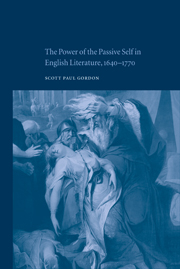Book contents
- Frontmatter
- Contents
- Acknowledgments
- Introduction. “Spring and Motive of our Actions”: disinterest and self-interest
- 1 “Acted by Another”: agency and action in early modern England
- 2 “The belief of the people”: Thomas Hobbes and the battle over the heroic
- 3 “For want of some heedfull Eye”: Mr. Spectator and the power of spectacle
- 4 “For its own sake”: virtue and agency in early eighteenth-century England
- 5 “Not perform'd at all”: managing Garrick's body in eighteenth-century England
- 6 “I wrote my Heart”: Richardson's Clarissa and the tactics of sentiment
- Epilogue: “A sign of so noble a passion”: the politics of disinterested selves
- Notes
- Bibliography
- Index
3 - “For want of some heedfull Eye”: Mr. Spectator and the power of spectacle
Published online by Cambridge University Press: 22 September 2009
- Frontmatter
- Contents
- Acknowledgments
- Introduction. “Spring and Motive of our Actions”: disinterest and self-interest
- 1 “Acted by Another”: agency and action in early modern England
- 2 “The belief of the people”: Thomas Hobbes and the battle over the heroic
- 3 “For want of some heedfull Eye”: Mr. Spectator and the power of spectacle
- 4 “For its own sake”: virtue and agency in early eighteenth-century England
- 5 “Not perform'd at all”: managing Garrick's body in eighteenth-century England
- 6 “I wrote my Heart”: Richardson's Clarissa and the tactics of sentiment
- Epilogue: “A sign of so noble a passion”: the politics of disinterested selves
- Notes
- Bibliography
- Index
Summary
The interpellation of all selves as interested selves, the aim not only of Hobbes's texts but of the social sciences themselves, ensures that all public behavior will be seen as rhetorical. Leviathan's sovereign functions as a permanent observer for whom subjects must tailor their conduct, lapses of which will be punished more swiftly and visibly than by God himself. As we have seen, Hobbes expects that after the sovereign's installation, when subjects act with the sovereign in mind, their behaviors will be legible. “He that keepe's a watchfull or vigilant eie upon that mans Interest whom he is to treate withall,” wrote Samuel Butler, “shall hardly be deceivd with fair Pretenses.” Hobbes promises that the sovereign's capacity to produce legible subjects, each recognizing and acting upon an interested self, will in turn produce social peace. Another view of a culture comprised of atomized, interested selves, however, is evident in the Spectator (1711–12), which also depicts all behavior as rhetorical, designed to satisfy or persuade imagined audiences, and which also shares the desire to produce legible subjects. The Spectator's aim, announced in its fourth paper, to “make both Sexes appear in their Conduct what they are in their Hearts” imagines the possibility of non-rhetorical subjects whose exterior signs will perfectly represent their internal feelings or motives. But the Spectator reveals that the strategies it borrows from Leviathan to achieve this aim – strategies that solicit each subject's interested self – merely provoke the suspicion that beneath public conformity lurk dangerous designs.
- Type
- Chapter
- Information
- Publisher: Cambridge University PressPrint publication year: 2002



